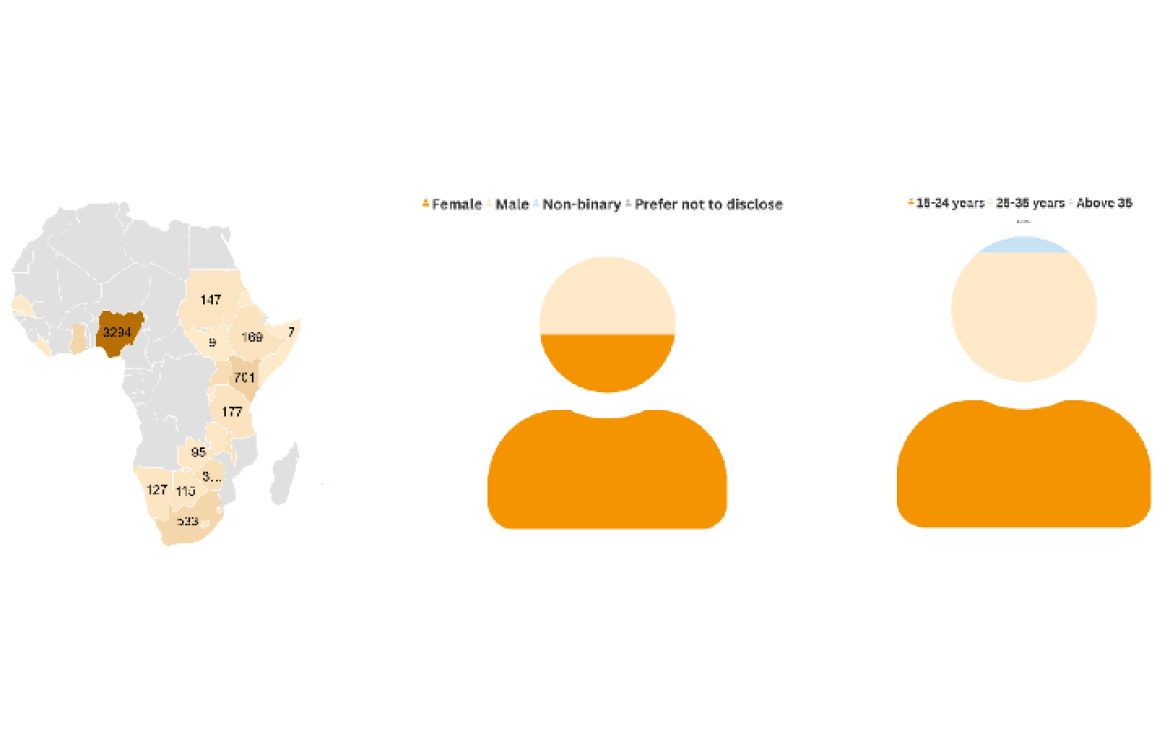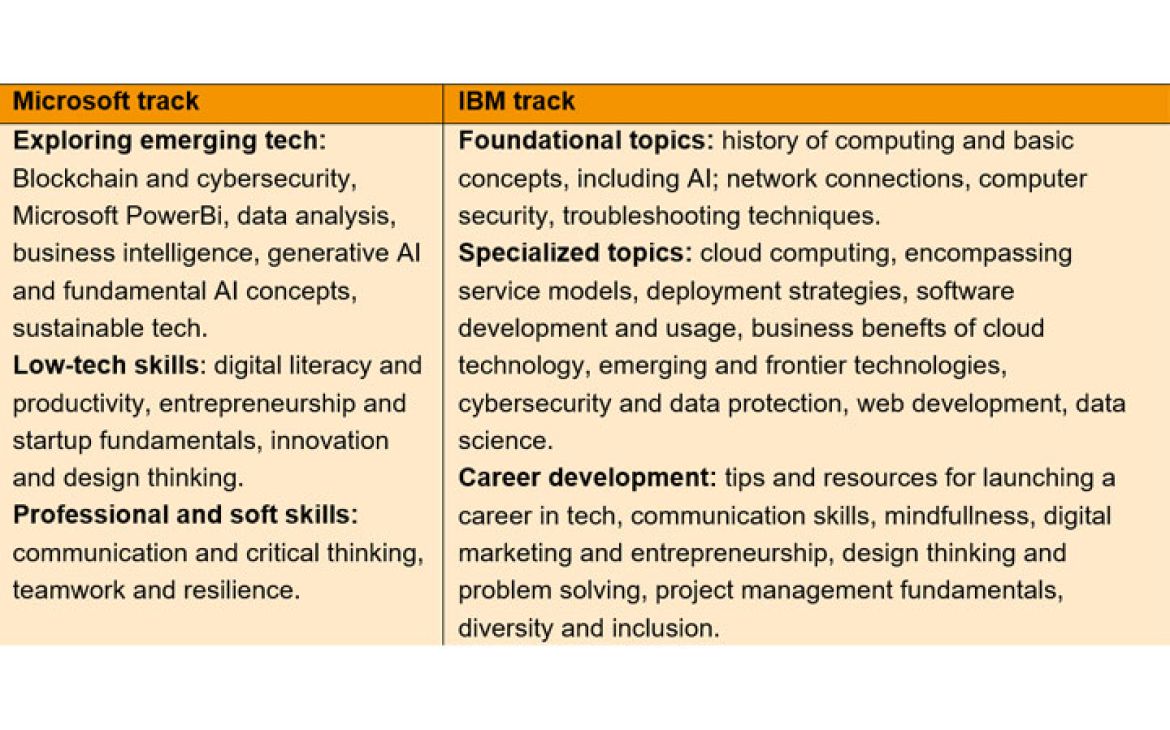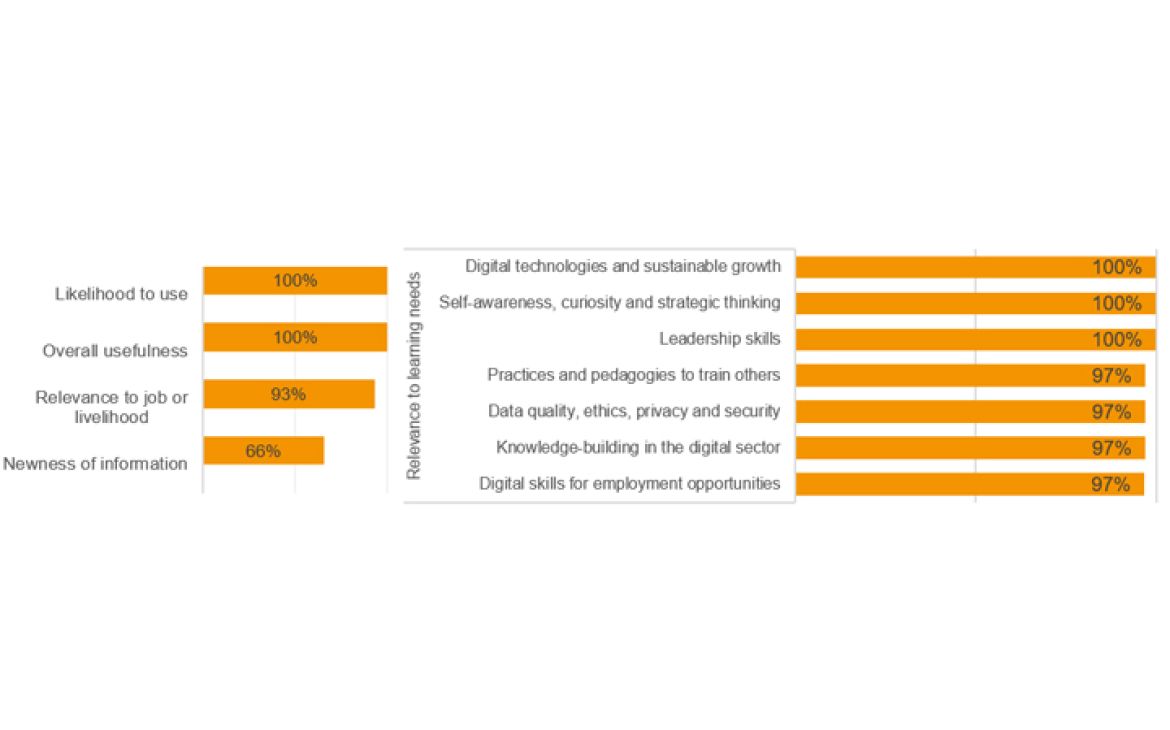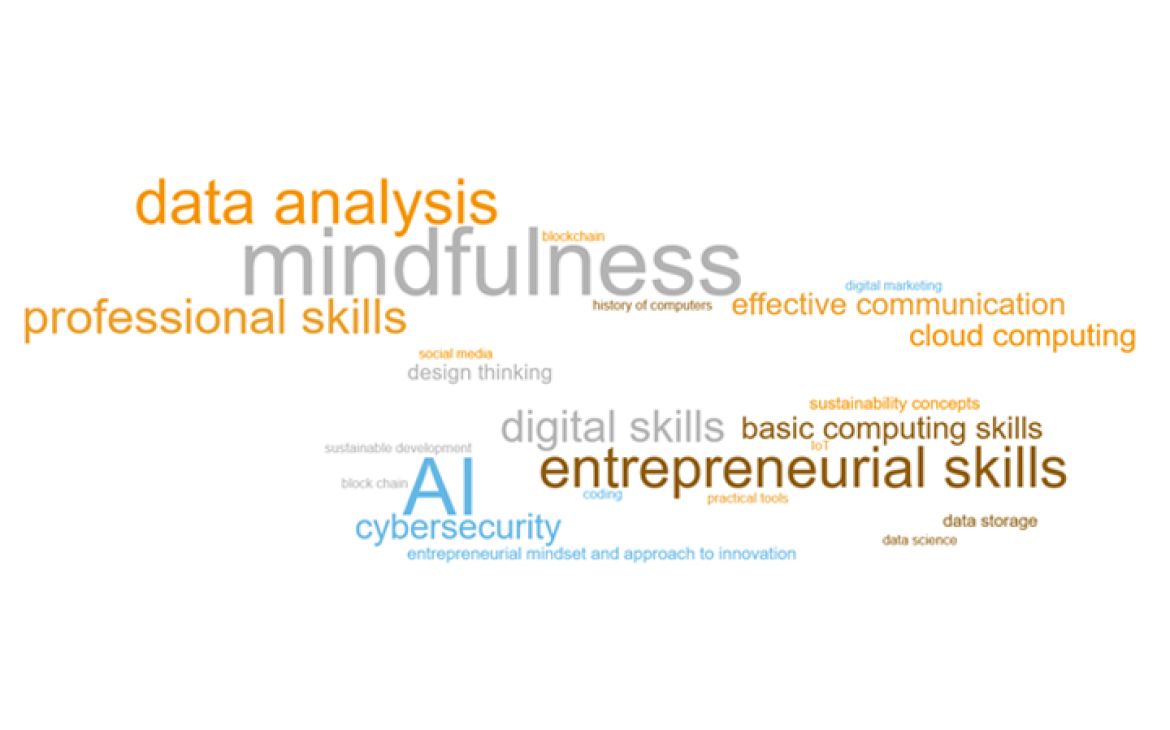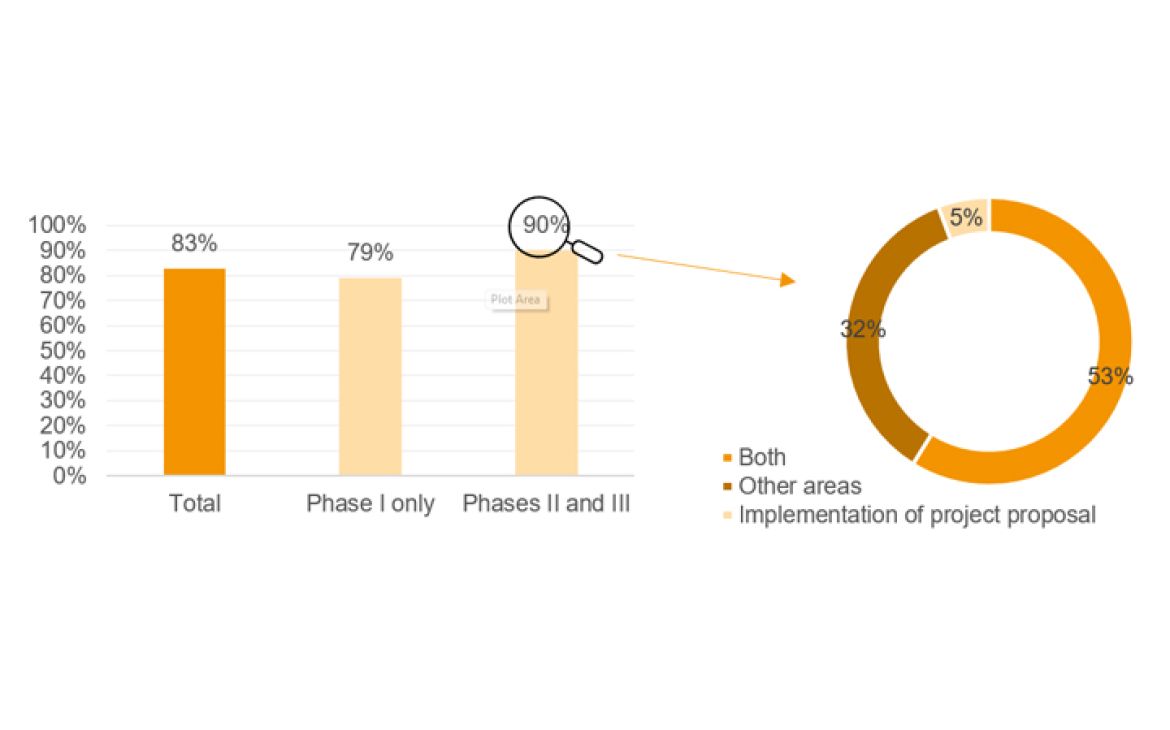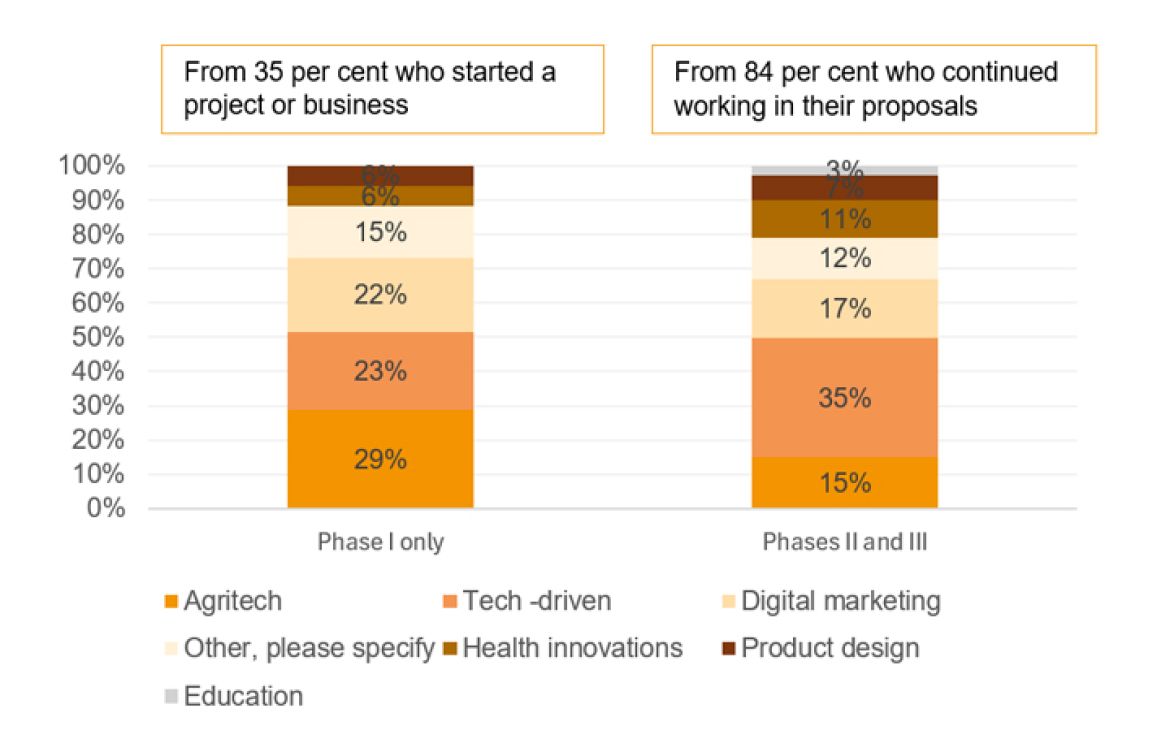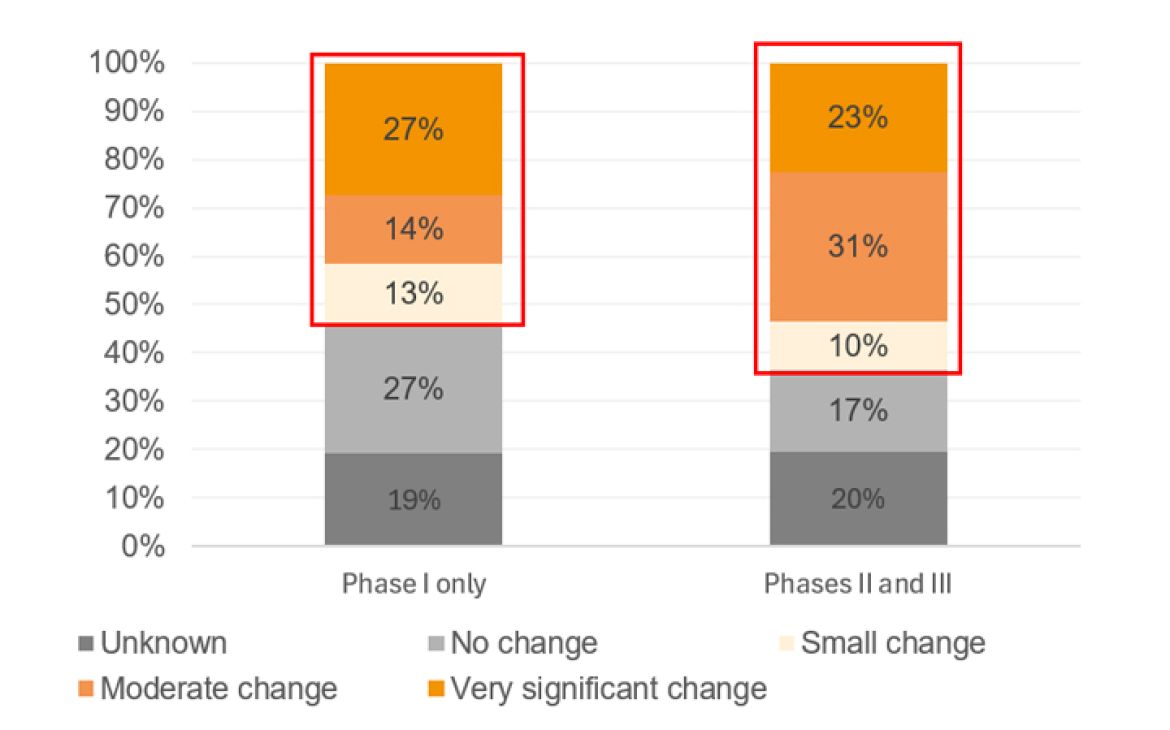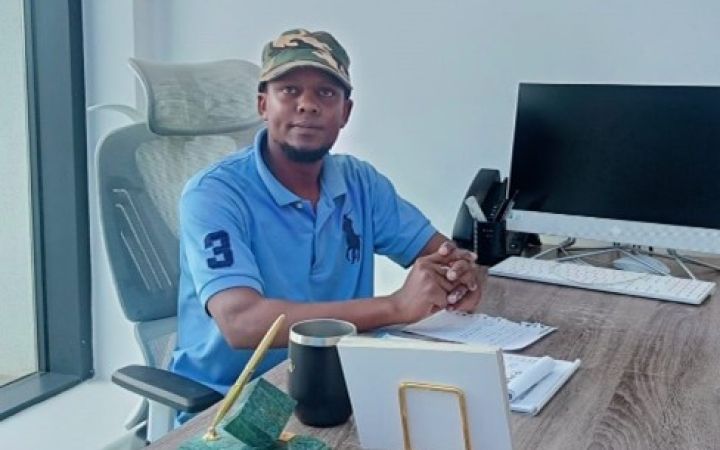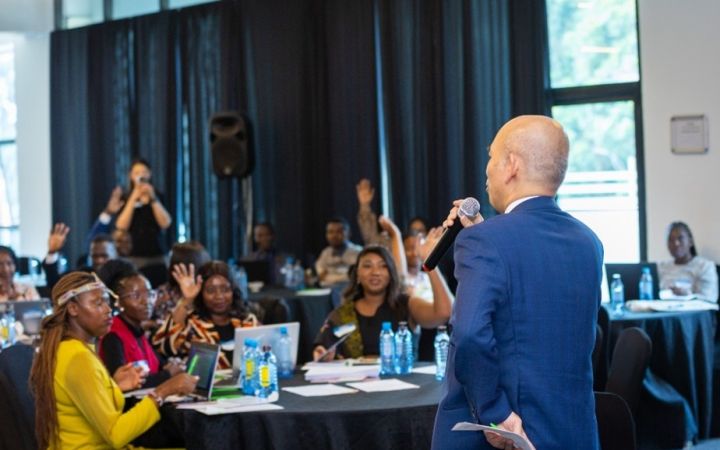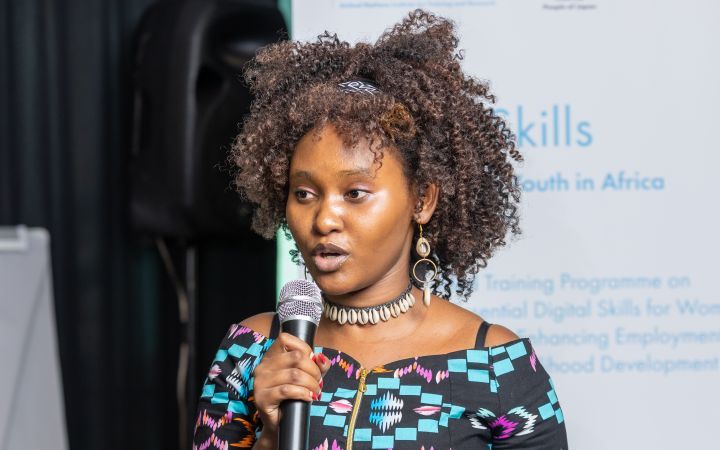Background
From basic computer literacy to advanced data analytics, digital skills are essential in today’s world and work environment. As more sectors shift to digital platforms and technologies continue to evolve, possessing these skills enables individuals to access better career opportunities and stay resilient in a rapidly changing job market. Given its commitment to Leaving No One Behind and promoting inclusive and sustainable economic growth, the UNITAR Division for Prosperity organized the “Developing Essential Skills for Women and Youth in Africa: Enhancing Employment Opportunities and Livelihood Development in the Digital Economy” programme. This Impact Story reveals that the programme was well received by participants and that the majority were able to use what they have learned, including some 20 per cent of participants who continued working on their business ideas or project proposals.
With the financial support of the Government and the People of Japan, the programme aimed at enhancing women's and youth's capacity to build and scale bankable innovations that respond to local social issues and demonstrate hands-on skills to grow in their professional paths in their respective countries and tap into the global workforce. The programme also counted on the technical support from IBM and Microsoft East Africa.
The programme received 8,392 applications and accepted 7,074 participants from 24 countries from the African continent, of which 70 per cent were female participants and 92 per cent were under 35 years old, as illustrated in Figure 1.
The programme was delivered in English between November 2023 and March 2024. It was implemented in three phases: i) foundational phase (online, self-paced, November – December 2023); ii) hackathon and self-led projects (online, December 2023 – January 2024); and iii) sustainability and community leadership training (online and hybrid, February – March 2024). The first phase was distributed between the IBM and Microsoft tracks, each focusing on a different skill set and expertise, as described in Table 1, built around three profiles: foundational, upskilling, and industry-specific track. Successful participants from Phase I had the opportunity to participate in the hackathon (phase II) and a smaller group of selected participants from Phase II advanced to the third phase of the programme.
Besides, UNITAR invited finance institutions to witness the project developments from the programme’s second phase, creating a bridge between participants’ ideas and potential financing mechanisms.
From the 7,074 participants in phase I, over 3,000 took part in the hackathon (phase II), and 50 were further shortlisted for the final phase of the project, from which 25 were selected for the in-person session in Nairobi.
This Impact Story intends to capture any changes that the programme may have generated in participants’ lives, including growth in their professional paths and innovations led. To do so, a follow-up survey was deployed seven months after the programme completion and three additional interviews were conducted with programme participants. The survey received 466 responses from phase I participants (7 per cent response rate) and 240 responses from participants from phases II and III (27 per cent response rate).
Links with the Sustainable Development Goals (SDGs)
The programme was aligned with SDG 5 “Gender equality”, SDG 8 “Decent work and economic growth”, and SDG 10 “Reduced inequalities”.
Programme Results
Overall, participants were satisfied with the programme, finding it useful and relevant to their learning needs, current jobs and livelihood strategies, as illustrated in Figure 2. The usefulness and relevance of the programme were not jeopardized by the fact that some one-third of the participants have previous knowledge of the programme topics. Moreover, participants praised the quality of the content and the opportunity to choose the learning path most adequate to their learning needs. A particularity highlighted by participants was the balance between the quality of the content and the ease of presentation. Participants from the IBM track also appreciated having the opportunity to interact with senior women in tech.
I have found the courses quite simple, objective, and have the ‘Wow Factor’. This means whenever you take time to read and take notes, you will be amazed at how much goes into developing everything Tech
For the future, they expressed interest in having more learning opportunities to keep updating the programme with upcoming emerging technologies. To improve future audiences, they recommended more engagement and increasing the time allocated to complete the self-paced component as well as having constant communication between community managers and programme participants, e.g. replying to participants’ queries, providing technical assistance, sending course reminders, etc. Participants also expressed concerns about the information provided regarding the certification process, which they deemed key for showcasing their newly acquired skills for professional growth, e.g. by including their certificates in their CVs. Participants from phases II and III also suggested having more information beforehand for the hackathons and on how finalists were selected.
Thank you for this life-changing experience. I recommend adding more training on upcoming emerging technologies, tailored to the technological landscape of each country
The seminar on how to go about the hackathon should be given before the hackathon starts. This will help participants have a fairer understanding of what is required of them.
Feedback from participants also suggests that the programme may have allowed some participants to fill in unaddressed learning needs due to financial constraints.
I was interested in Learning business analysis but I had no money to pay the fees, through UNITAR I have been able to learn these skills and several other skills provided for free.
Right after finishing the programme, participants found themselves better equipped with digital, entrepreneurial, and professional skills. For some participants, this blended approach allowed them to acquire an entrepreneurial mindset and a shift in their approach to innovation, as illustrated in Figure 3.
Considering that all participants who provided feedback after the training indicated that they intended to use knowledge and skills from the training, the impact story survey results were analysed. These indicate that 83 per cent of participants have put into practice the acquired knowledge and skills (Figure 4). Participants who took part in the second and/or third phases of the programme, showed a higher application rate compared to those only participating in the first phase. They mostly used the new learning in both the continuation of their project proposals and in their professional and personal lives.
Creating dashboards to monitor work processes and make data-driven decisions has been a game-changer in my team management roles. – Participant from Phase I
Applying Cybersecurity in both my personal life as well as the work environment. Keeping passwords secure, updating password as well as setting strong passwords. – Participant from Phase II/III
For those participants from phases two and three who continued working on their project proposals (84 per cent), 25 per cent are fully implementing their proposals. The majority of their projects fall under the areas of tech-driven, digital marketing, agritech, and other areas (Figure 5). Although participants from the first phase did not receive specialized training to develop self-led projects, 35 per cent indicated having started their own business or project proposal after participating in the programme. Their proposals fall in the areas of agritech, tech-driven, and digital marketing.
Either in the development of a business or project idea or in their professional or personal lives, the application of knowledge and skills has led to broader organizational changes for at least 50 per cent of participants from Phase I and more than 60 per cent for those taking part in phases II and III of the programme (Figure 6). These changes include automation of repetitive tasks that have improved work efficiency, increased confidence levels of team members, structured approach to project management, adoption of digital skills by clients, shifts in participants’ professional paths, and, certainly, implementation of new business ideas or projects.
My team members are more confident and very co-operative at meetings. Team work has become a breeze. This happened because I created an environment whereby everyone's opinion is truly taken into consideration and appreciated. – Participant from Phase I
My turnover increased by 10% – Participant from Phase II/III
Moreover, most of these changes are derived from participants’ implementation of their business ideas or project proposals for any of the phases they were involved, as it was intended by the programme. Yet, there were participants who have not worked on a business idea but applied knowledge and skills from the programme and were able to observe very significant changes (Figure 7).
Factors that facilitated the application of knowledge and skills and observed changes identified by survey respondents were the importance of these skills to participants’ jobs, having the opportunity for the application of knowledge and skills, and the adaptability of the knowledge and skills to their context. On the contrary, hindering factors identified by participants from Phase I was funds and time constraints faced by them during the programme, while for participants from Phases II and III, these were the availability of funds and not having the appropriate networks to continue their projects or business ideas, despite the programme’s efforts in connecting participants with other stakeholders.
To illustrate better how participants have applied knowledge and skills from the programme, three stories from participants from phases I and II are presented next.
Abdulganiyy Oyeyemi - Operations Manager – Ibeju Lekki Local Government Garbage Collection Office.
Embracing online tools for collaboration
Lagos, Nigeria. Abddulganiyy is an operations manager at the Ibeju Lekki local government garbage collection office and the head of operations at a private firm specializing in recycling and waste collection in underserved areas in Nigeria. Considering his responsibilities of collaborating with an international team and handling operations across regions in the country, he recognized the need for professional growth and continued his learning journey. For this reason, Abdulganiyy enrolled in the UNITAR programme, participating in the first two phases. The programme brought him closer to online tools and resources that have facilitated workflow in his day-to-day tasks.
Abdulganiyy is the only person in his company based in Nigeria and works with a team that is spread across different countries, such as the United Kingdom, the United States of America, and China, which can be a challenge for coordination. Before the programme, Abdulganiyy did not have much experience in leveraging online tools for managing teams collaboratively. Through the UNITAR programme, he familiarized himself with online tools such as Google Drive for sharing documents with his colleagues and AI-powered note-taking applications. These newfound tools transformed his workflow and he considers that his work is more coordinated now. Moreover, the programme’s team-building modules provided him with insights into fostering collaboration and inclusivity. Abdulganiyy says he is now practicing active listening and tries to create an environment where other team members feel valued, which he considers has created a greater sense of belonging in the team.
Another useful piece of knowledge for Abdulganiyy was social media ads. As part of his work, he launched a Facebook ad to raise awareness about a new waste collection initiative. Leveraging digital marketing strategies learned about in the programme, the social media campaign launched by Abdulganiyy reached over 7,000 individuals in 24 hours. He attributes 100 per cent of this success to the knowledge gained during the UNITAR programme.
Abdulganiyy has, unfortunately, not continued implementing the project proposed during the hackathon, a mobile application that helps estimate users’ emissions, due to competing priorities at work and lack of capital to continue doing so.
Abdulgainyy acknowledges the support of his team as an enabling factor for applying technical and soft skills from the programme. He is truly appreciative of the knowledge and skills gained during the programme but would have appreciated more interaction from community managers, for example, having a communication channel to nudge participants who can easily forget about the programme given their many other responsibilities in the workplace.
Stephen Ilia Paul Member of a Community Based Organization
Leadership skills for community organization
Nairobi, Kenya. Stephen is part of a community-based organization (CBO) dealing with climate resilience and community development registered in the East African Community in Nairobi. He started his work in the CBO in 2023, a bit before he started the UNITAR programme as he was interested in scaling his leadership and entrepreneurial skills to better serve his new role. He participated in the first phase of the programme in the foundational Microsoft track. Stephen is also an entrepreneur and is currently developing two project ideas: one related to agribusiness and another one on real estate.
As part of the programme, Stephen participated in the modules related to developing emotional intelligence and conflict resolution skills. These skills proved invaluable in addressing internal crises in the CBO, such as a recent dispute over organizational licensing, where he was able to apply conflict resolution skills. Furthermore, the leadership skills also proved useful in maintaining motivation in scaling up the initiatives of the CBO. For example, Stephen was able to align the organization's goals with modern standards. He considers that this restructuring positioned the organization to better address the community's needs.
While his two business ventures did not come as a result of the programme, the skills gained during the programme helped him to continue the conceptualization of the initiatives. The real estate agency focuses on providing innovative housing solutions, while the agritech initiative addresses food sufficiency through a three-pronged approach: farming, research, and e-commerce. The e-commerce platform will facilitate the buying and selling of agricultural resources, creating a sustainable ecosystem for local farmers and consumers. The research component focuses on studying indigenous seeds to understand the impact of climate change and promote food sovereignty. The farming aspect is dedicated to producing pure organic foods and crops, utilizing advanced agricultural technologies such as hydroponics, aquaponics, vertical farming, precision agriculture, and automated irrigation systems.
Stephen also considers that the problem-solving skills acquired during the training have also helped him with the projects’ development. He has used these skills to navigate the tedious registration processes of the business.
It is worth mentioning that Stephen has participated with another ten colleagues in another leadership training prior to the UNITAR training, but he considers that this was complementary to the UNITAR programme instead of duplication. He praised both training events for the changes experienced in his leadership skills but the UNITAR training brought to him additional skills, such as the problem-solving skills mentioned before. He hopes the UNITAR programme could reach more people in the region and suggests that for future audiences the online videos can be shorter considering potential internet (network) limitations that some participants may face as well as extending the timeline for the self-paced component.
Israel Enah Otei Sales officer – CHI Pharmaceutical Limited
Data driven sales
Uyo, Nigeria. Israel holds a master’s degree in public health and is currently working as a sales officer at CHI Pharmaceutical Limited, a private company in the health sector. Israel recognizes the difficulties in entering into the labour market for some sectors, such as the health sector, but when during his studies he learned that one potential area of work in public health was data analysis of health-related information, he got motivated to pursue this path. Motivated to learn more about this, Israel enrolled in the “essential digital skills” UNITAR programme. Also, he has always admired the work of the UN and did not hesitate to register for the programme, participating in the first two phases.
During the training, Israel was introduced to technological tools and concepts, including Microsoft 365, data analysis and visualization tools like Tableau and Power BI, and virtual collaboration techniques. Israel enjoyed a lot the data analysis part of the course and after taking the course, he bought a laptop and enrolled in a data analysis course from Coursera.
The combination of these two courses proved useful for his work. As part of his job as a sales officer, Israel has to report to his superior on the daily progress of the sales he manages. Before the training, Israel did this through WhatsApp and did not have a record himself based on this data. After the training, he started to put together a database in Excel with the data from his daily reporting. Having this record was useful for him to boost his sales performance. The main example came when Israel faced a critical challenge: a batch of insulin worth significant company revenue was nearing its expiration date. Using his Excel database, Israel analysed daily reports that had previously been fragmented and underutilized. The data revealed gaps in his sales strategy, particularly a lack of engagement with medical doctors who could prescribe the product. After finding this, he connected with “the right doctors” and was able to sell the batch before expiration. The results were positive and well-received by his supervisor.
Beyond the digital skills, the UNITAR programme introduced him to be more culturally aware and collaborative, which he considers useful for his current job. Israel considers the programme to be his first step to pursue a professional career in data analysis in the health sector, where he is currently looking for more opportunities. Israel is grateful to the UNITAR programme and would have liked to be connected to an alumni group where more insights for job applications could have been included, for those like him trying to pursue a new professional path or just trying to have more opportunities to apply knowledge and skills.
Betty Mwende - Student of applied computer technology and communication coordinator
Closing the digital gap for youth
Kenya. Betty is an applied computer technology student and the communicator coordinator of a non-profit organization. Betty also volunteers to teach basic computer skills to children in her community to help bridge the digital gap. Participation in the UNITAR programme helped Betty to develop her project management and digital skills while championing digital literacy for marginalized youth.
When Betty saw the UNITAR programme, she was intrigued by the opportunity and applied, and she was selected to join the Microsoft track. In the online phase 1, Betty gained foundational digital skills that were theoretical but also applicable to the working environment. Using what she learned from UNITAR, Betty won a design and pitch competition by a philanthropic private organization. Her award was a cash prize of $1,000, which she used to buy a laptop to deliver the digital skills training to girls in her village.
She was chosen to continue to the second phase of the UNITAR training, where she developed her self-led project and joined a virtual boot camp. The final phase, phase 3, brought everything together for an in-person sustainability and community leadership training workshop in Nairobi. For Betty, this was one of the most memorable parts of the programme. The workshop sessions allowed her to network and meet individuals from diverse fields, many of whom were like her, seeking to build their digital literacy skills, even after years of professional experience. Betty was inspired by the connections she made.
Pitching her ideas and experiences to international experts built Betty's confidence while also giving her work greater exposure. Media interviews let Betty amplify her advocacy and share her story with a wider audience.
Betty encourages others - especially women, marginalized youth and persons with disabilities - to step into the digital space. As a person with a disability herself, Betty says she did not imagine 5 to 10 years ago that she would be studying technology today. But she believes there's no better time for women with disabilities to get into the tech spaces as they become more inclusive.
She calls on women and youth to embrace opportunities, even when they seem challenging.
Nobody's going to do this for you, so it's up to you to do it, she says and recommends networking, gaining practical skills and staying committed to overcoming obstacles.
Conclusion
The content and overall design of the programme were well received by participants and allowed them to leverage their knowledge and both digital and professional skills. When looking at gained knowledge and skills, both digital and soft skills were equally important for participants, e.g. for some participants mindfulness was the most important learning experience from the programme.
Evidence on the application of knowledge and skills and broader organizational changes was collected by this Impact Story. Most participants got the chance to apply knowledge and skills from the programme, especially those participating in phases II and III. Part of these application areas are related to the continuation of work in their business ideas or project proposals, even for participants from phase I. Participants suggested that having more interaction and information about participants' selection to the following phases would have been helpful to plan better for the continuation of their projects or business ideas.
Furthermore, while not all, some participants confirmed that the application of knowledge and skills led to broader changes either in their organizations, in their professional lives, or in totally implementing their business ideas or project proposals. Again, changes were more frequent for participants from Phases II and III than for participants from Phase I, but still changes could be identified from participants following different phases, tracks and paths.


